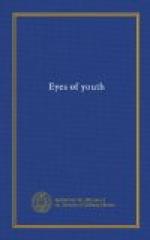If the writers have a real point of union it is in a certain instinct for contrast between their shape and subject matter. All the poems are brief in form, and at the same time big in topic. They remind us of the vivid illuminations of the virile thirteenth century, when artists crowded cosmic catastrophes into the corner of an initial letter; where one may find a small picture of the Deluge or of the flaming Cities of the Plain. One of the specially short poems sees the universe overthrown and the good angels conquered. Another short poem sees the newsboys in Fleet Street shouting the news of the end of the world, and the awful return of God. The writers seem unconsciously to have sought to make a poem as large as a revelation, while it was nearly as short as a riddle. And though Francis Thompson himself was rather in the Elizabethan tradition of amplitude and ingenuity, he could write separate lines that were separate poems in themselves:—
“And thou, what
needest with thy tribe’s black tents,
Who hast the red pavilion
of my heart?”
A mediaeval illuminator would have jumped out of his sandals in his eagerness to illustrate that.
G.K. Chesterton.
FRANCIS THOMPSON
THREATENED TEARS
Do not loose those rains thy wet
Eyes, my Fair, unsurely threat;
Do not, Sweet, do not so;
Thou canst not have a single woe,
But this sad and doubtful weatlier
Overcasts us both together.
In the aspect of those known eyes
My soul’s a captain weatherwise.
Ah me! what presages it sees
In those watery Hyades.
ARAB LOVE SONG
The hunched camels of the night*
Trouble the bright
And silver waters of the moon.
The Maiden of the Morn will soon
Through Heaven stray and sing,
Star gathering.
Now while the dark about our loves is strewn,
Light of my dark, blood of my heart, O come!
And night will catch her breath up, and be dumb.
Leave thy father, leave thy mother
And thy brother;
Leave the black tents of thy tribe apart!
Am I not thy father and thy brother,
And thy mother?
And thou—what needest with thy tribe’s
black tents
Who hast the red pavilion of my heart?
* The cloud-shapes often observed by travellers in the East.
BUONA NOTTE
Jane Williams, in her last letter to Shelley, wrote: “Why do you talk of never enjoying moments like the past? Are you going to join your friend Plato, or do you expect I shall do so soon? Buona Notte.” This letter was dated July 6th, and Shelley was drowned on the 8th. The following is his imagined reply from, another world:—
Ariel to Miranda:—hear
This good-night the sea-winds bear;
And let thine unacquainted ear
Take grief for their interpreter.




